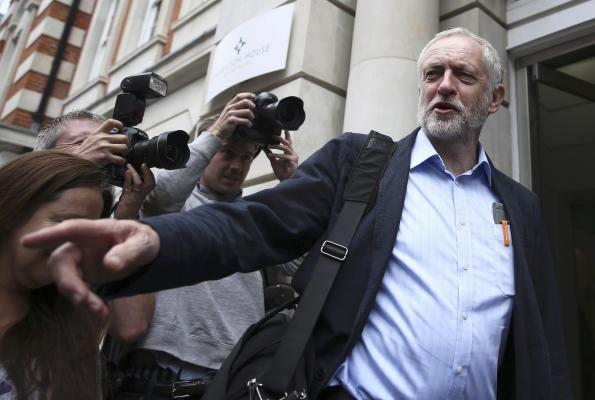America had an exceptional few days last week as the Republican Party officially adopted the billionaire right-wing firebrand Donald Trump as its presidential candidate for next November’s race to the White House. In the meantime, across the Atlantic, where the vote to leave the European Union shook Britain and ended the premiership of the ‘dovish’ Conservative David Cameron without causing much damage to the Conservative Party, it was the Labour Party that entered an internal crisis. As the majority of Labour’s members of Parliament rose against their radical left-winger Jeremy Corbyn, the latter challenged them by barricading behind party activists and trades unions.
Despite the wide ideological gulf between ‘rightist’ Trump and ‘leftist’ Corbyn, there is one thing in common between them; both are extremists who are willing to do anything in the pursuit of power.
Trump, who is regarded by many Republicans as an ‘outsider’ and has never been elected to public office, has acutely polarised the party and confronted its ‘establishment’ by riding an extremist wave of populism and xenophobia bordering on outright racism. Then, even after securing the nomination, he is continuing his escape forward with a blatant populism totally unbecoming of a leader of a pluralistic, advanced and institutional superpower like America.
Corbyn, on his part is not really behaving like leader of a ‘party of government’ which cannot implement its programme without winning elections. Indeed, he is acting and talking more like an activist in a protest movement or a strike or picket organizer despite realising that he has lost the trust and loyalty of his parliamentary colleagues who believe his radicalism will destroy the party’s chance in any future elections. He not only refuses to resign but is also inciting against his fellow parliamentarians! He is even calling them “Blairites”, accusing them of being “rightists’, and insisting that he will lead Labour during the next elections.
How did two such men, too far from the concept of rational and responsible democracy, manage to come so close to reach the top?! The most likely answer is that the crisis the two major American and British parties are going through is much more serious than a being afflicted with an adventurist, dogmatist or demagogue as a leader. It is rather a complicated problem that has something to do with the parties’ fabric, popular bases, and mechanism of decision taking; currently manifested by a hysterical and mass suicidal attitude due to gradual erosion of moderation and rationalism.
There is no doubt that lobbies and interest groups, such as the extreme rightist ‘The Tea Party’ and radical ultra conservative evangelists have provided for a while a ready and fertile ground for racist posturing by the likes of Donald Trump, Ben Carson and others during the Republican primaries. It is obvious from what happened at the Cleveland Republican Convention that eager pro-Trump supporters do not care less about broadening the appeal of the party ticket by trying to gain uncommitted ‘centrists’ or neutralising foes, as these supporters are hostage to their parochial and factional bigotry that drives them even to resort to personal attacks and character assassination.
On the ‘Left’, ironically the suicidal image does not seem too different. The British Labour Party is no less hostage to its militants groups than the GOP is to the extreme Right and ultra conservative evangelists. Corbyn and his fans seem to have deliberately forgotten the years of ‘exile’ from power between 1979 and 1997, brought about by voters’ rejection of the extreme ‘Left’ led by ‘Militant Tendency’ which has dominated the party and trade unions. Although Labour later managed to end this destructive dominance, anomalies in the leadership selection process ensured Corbyn’s victory thanks to votes of party activists and bloc votes of the unions. Relying on those, Corbyn is escaping forward, threatening Labour’s unity and ignoring electoral realities.
Extremism as a phenomenon usually appears in unusual stressful circumstances, such as when national dialogue breaks down, coexistence is becoming more difficult, or when the country faces external threat. Under such circumstances worried citizens obsessed by complicated questions rush to those who give them easy answers and simple recipes. As we know from experience, there is nothing in politics easier than finding quick and radical ‘solutions’ in ‘black and white’ to profoundly complicated problems.
During the last few centuries the West, namely since the French Revolution, witnessed the rise of radical ideologies that brought about various ethnic, class-based, religious and regional cultures. The French Revolution marked the rise of Liberalism, soon followed by Conservatism, and the Socialist – Communist alternative. The collapse of empires – which are by definition multi-ethnic – led to the emergence of ethnic and nationalist concepts and loyalties, with the help of geography and regional facts.
Since the mid-20th century, specifically after the end of WW2, extreme racist nationalisms like German Nazism and Italian Fascism lost, leaving only one competitor to Western democratic concepts; it was Communism as championed by the two ‘red’ giants the USSR and China. With the exception of the countries of Eastern Europe which after WW2 technically fell under Soviet influence, the rest of Europe went through liberal democracy in different speeds and styles; from the smoothest and most sophisticated like the Scandinavian countries and Switzerland, to the rough and slow such as Spain, Portugal and Greece.
Despite these democratic strides, extremism, on the right or left, never disappeared. Rather, it managed to gain momentum thanks to several factors including foreign immigration, asylum seekers, terrorism, and adverse economic conditions. Today, extremist right-wing xenophobic parties are enjoying unprecedented popularity in countries like the Netherlands and Austria, while radical left-wing parties have broken the support base of moderate socialists in countries like Greece and Spain. Finally, a third trend, represented by nationalist – secessionist parties, has now become a reality that is proving itself through the ballot box without having to resort to violence.
